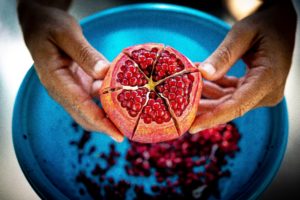
October is Liver Cancer Awareness Month. Since I’m married to a renowned hepatologist and gastroenterologist, I want to spend some time delving into ingredients that help us take care of the liver, the metabolic powerhouse of our bodies. When I first started dating my husband, I thought the heart was the most important organ in the body. He quickly proved me wrong. Advances in science have allowed us to build mechanical hearts (or even grow a new heart from our own stem cells), but we cannot build a machine that can mimic the many metabolic functions the liver conducts for us every single day. It’s truly a remarkable organ. Did you know that after a live donor liver transplant, the liver will regenerate in both the donor and the recipient in about three months? You learn a lot of interesting things with a liver doc in the house.
Ingredients FOR LIVER HEALTH
So where does liver health intersect with food science? Over the last decade, scientists have begun to study the hepatoprotective effect of certain ingredients. I briefly touched on this in a Prepared Foods article last year when I shared aged black garlic was shown to have hepatoprotective benefit in a pre-clinical trial. Beyond this, there are several other ingredient options that may be helpful in improving liver health and function. Below are a few I find interesting:
- Pomegranate Extract: The fruit of the gods gets a lot of great press for its antioxidant content and delightfully tart flavor. demonstrated the hepatoprotective effect of a phenolic-rich pomegranate extract in mice fed a high fat diet. A similar report in Frontiers in Pharmacology published last year showed pomegranate also had hepatoprotective activity against liver damage induced by CCl4 in rats. Pomegranate-based ingredients are perfect for providing natural color and flavor–understanding their health impact make them a great multi-faceted choice for food and supplement formulations.
- Soy and Whey Proteins: Proteins are a deep area of fascination for me because of the wide varieties of functionality whole proteins and their hydrolysates provide to food, not to mention their inherent nutritional value. Thus I found it highly intriguing that soy consumption was associated with reduced incidence of non-alcoholic fatty liver disease (NAFLD) according to a recent study in the Journal of Nutrition. Perhaps this is due to one soy protein in particular, β-conglycinin, as a 2018 review article in the International Journal of Molecular Sciences highlighted the hepatoprotective effects of β-conglycinin against NAFLD as well as alcohol induced fatty liver disease. Additionally, a study published last year in Nutrients showed the hepatoprotective effects in pre-clinical work of a foam made with whey protein hydrolysate and stabilized by a polysaccharide combination. The same foam also showed anti-hypertensive activity, which I don’t find the least bit surprising as dairy proteins are known for being an excellent source of bioactive peptides. Proteins could be as good for the liver as they are for the diet.
- Trehalose: A naturally occurring sugar found in many foodstuff, trehalose often is used in food formulations because of its ability to retain moisture and reduce freezing points. Several studies published in the last five years have linked trehalose with a weakening of liver disease in pre-clinical trials.
There are several other botanical actives and ingredients being studied for their impact on liver function, but I chose to highlight the above, as it is helpful for formulators when a single ingredient provides multiple benefits. I should note that curcumin, the active component of turmeric, also is of great interest for treating NAFLD. However, with the plethora of curcumin ingredients currently on the market and most of them claiming to be the most bioavailable form, I want to investigate further and address the topic in a future post.
LOVE YOUR LIVER BY LOVING YOUR GUT
It’s also worth noting that researchers have taken note of the existence of the gut-liver axis, by which our gut microbiome plays a role in liver health and vice versa. When the gut microbiome isn’t well maintained, it can play a role in liver disease, but by taking care of our gut, we can positively impact liver health. A review article published in the International Journal of Molecular Sciences in 2016 highlighted probiotics may be helpful in the treatment of NAFLD, among other issues such as obesity and type 2 diabetes. It’s a common theme you will often hear from me–our gut plays an important role in many bodily functions. So if you want to love your liver, make sure you love your gut too!
If you are interested in learning more about ingredients for liver health, leave me a comment below or connect with me on Twitter.
